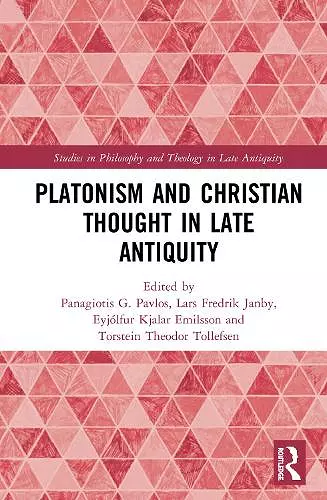Platonism and Christian Thought in Late Antiquity
Eyjólfur Kjalar Emilsson editor Torstein Theodor Tollefsen editor Panagiotis G Pavlos editor Lars Fredrik Janby editor
Format:Hardback
Publisher:Taylor & Francis Ltd
Published:25th Jun '19
Currently unavailable, and unfortunately no date known when it will be back
This hardback is available in another edition too:
- Paperback£42.99was £42.99(9781032092003)

Platonism and Christian Thought in Late Antiquity examines the various ways in which Christian intellectuals engaged with Platonism both as a pagan competitor and as a source of philosophical material useful to the Christian faith. The chapters are united in their goal to explore transformations that took place in the reception and interaction process between Platonism and Christianity in this period.
The contributions in this volume explore the reception of Platonic material in Christian thought, showing that the transmission of cultural content is always mediated, and ought to be studied as a transformative process by way of selection and interpretation. Some chapters also deal with various aspects of the wider discussion on how Platonic, and Hellenic, philosophy and early Christian thought related to each other, examining the differences and common ground between these traditions.
Platonism and Christian Thought in Late Antiquity offers an insightful and broad ranging study on the subject, which will be of interest to students of both philosophy and theology in the Late Antique period, as well as anyone working on the reception and history of Platonic thought, and the development of Christian thought.
"[A] fine and engaging compendium on an exciting subject matter – the mutual relationship of Platonism and Christianity... a highly informative and rich book. The individual chapters... provide a glimpse into the exciting times of philosophical debates that shaped Christianity as we know it. The work as a whole succeeds in shedding, so to say, new light on old questions, but also on some less explored subjects, and thus promises to remain an interesting and informative reading for students and scholars of both Early Christianity and Late Platonism, as well as for historians of ideas in general." - Review of Ecumenical Studies
"[A] highly engaging reading that will surely elicit further research in Patristic Platonism." - Classical Journal
"...successfully challenges the basic assumptions of much discussion surrounding Christianity and Late Antique intellectual discourse. As such the volume is successful in challenging the reader not to view the relationship between Christianity and Platonism in the simplistic terms of enmity and competition, but rather as a complex and multifaceted relationship, sometimes positive, sometimes negative, but always profitable. This is a volume that complements recent scholarship on Late Antique philosophy and Christianity, and I would recommend it to all those interested in Late Antique Christianity, the interactions between ‘pagan’ and Christian intellectual discourse, and the general development of Late Antique philosophy." - Diogenes
"L’ouvrage livre un riche et stimulant aperçu de la variété des questions qui animaient les penseurs païens et chrétiens de l’époque... cha>que contribution illustre à sa façon la omplexité des liens entre platonisme et christianisme ainsi que la profondeur des idées tardo-antiques, encore trop souvent jugées inférieures à celles qui les ont précédées." - Laval Théologique et Philosophique
[The book provides a rich and stimulating overview of the variety of questions that animated the pagan and Christian thinkers of the time... each contribution illustrates in its own way the complexity of the links between Platonism and Christianity as well as the depth late-antique ideas, still too often considered inferior to those that preceded them.]
"PCTLA est utile non seulement pour les chercheurs experts, mais aussi pour les jeunes étudiants, qui pourront aisément s’orienter dans les spécialités des études recueillies dans ce volume. En définitive, PCTLA atteint pleinement son but en fournissant un aperçu complet et approfondi de la relation complexe entre platonisme et christianisme dans l’Antiquité tardive." - Revue des Sciences Philosophiques et Théologiques
[PCTLA is useful not only for expert researchers, but also for young students, who can easily orient themselves in the specialties of the studies collected in this volume. Ultimately, PCTLA fully achieves its purpose in providing a comprehensive and in-depth insight into the complex relationship between Platonism and Christianity in Late Antiquity.]
"Somme toute, Platonism and Christian thought in late antiquity affronte le défi du complexus, en ce qu’il essaie de dénicher les rapports de dialogue et de contraste parmi des penseurs profondément différents, certes, mais ayant pour but commun la compréhension du mystère du divin : et l’effort visant à retrouver, examiner et confronter les tesselles de cette mosaïque est couronné de succès. Les spécialistes des études comparatives entre Christianisme et Néoplatonisme pourront maintenant se servir d’un outil nouveau et innovant d’un point de vue méthodologique aussi bien que sur le plan du contenu (notamment au sujet de St. Augustin, Denys l’Aréopagite et St. Maxime le Confesseur)." - Revue Philosophique de Louvain
[All in all, Platonism and Christian thought in Late Antiquity confronts the challenge of the complexus, in that it tries to unearth the relationships of dialogue and contrast among thinkers who are profoundly different, certainly, but who have the common goal of understanding the mystery of the divine: and the effort to find, examine and confront the tesserae of this mosaic is crowned with success. Specialists in comparative studies between Christianity and Neoplatonism will now be able to use a new and innovative tool from a methodological point of view as well as from a content point of view (in particular concerning St. Augustine, Dionysius the Areopagite and St. Maximus the Confessor).]
ISBN: 9781138340954
Dimensions: unknown
Weight: 621g
316 pages